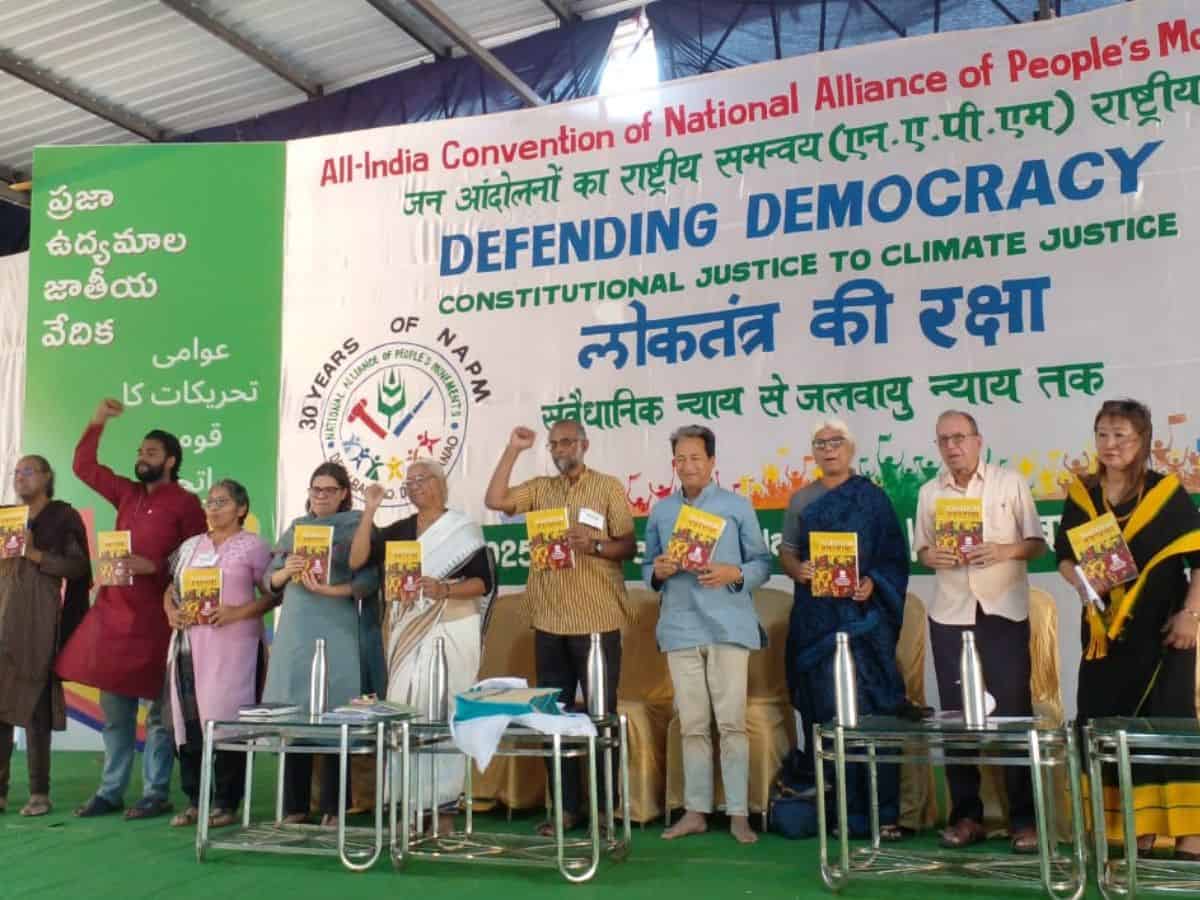
Hyderabad: Environmental activist Sonam Wangchuk remarked that the demand for inclusion of Ladakh in the sixth schedule of the Indian Constitution did not come from the people, but was a promise made by the Bharatiya Janata Party (BJP) in its manifesto during the 2019 Lok Sabha elections, and again during the elections for the Ladakh Hill Council in 2020.
He was speaking at the national convention of the National Alliance of People’s Movements (NAPM) held at the Exhibition Grounds in Hyderabad on Saturday, March 1. The convention commemorated 30 years of NAPM’s journey with the theme – “Defending Democracy- Constitutional Justice to Climate Change.”
Addressing the gathering, Sonam Wangchuk said that the Centre’s promise of including Ladakh in the sixth schedule of the Constitution was broken and forgotten within a couple of years of coming to power, and presently the ruling establishment was questioning the legitimacy of the demand.
“It has also been recorded in the minutes of the National Commission of Scheduled Tribes’ meeting that the Centre was considering sixth schedule status for Ladakh. However, a year after the 2019 Lok Sabha elections, there has been an absolute silence on the issue. Interestingly, those reminding the Indian government of its promise are being persecuted,” Sonam Wangchuk said, recalling how youngsters who questioned the Governor about the Centre’s proposed promise were taken into custody and beaten up.
Wangchuk alleged that the Centre’s reversal of its promise was due to pressure from major corporates and industrial lobbies, as a 3-gigawatt solar power project is planned in Ladakh, requiring the acquisition of 40,000 acres across 150 sq km. “The project is 3-4 times bigger than the largest solar power project in the world,” he noted.
He said the solar project is being developed in a region known to produce the finest pashmina. The project is bound to drive away the shepherds and their goats from that area, which serves as grazing land and the only means of their livelihood.
“The governments will anyway succumb to pressure from the industrial lobbies,” he said.
Expressing hope, he said that a strong people’s movement will force the governments to do the right thing. “It was after tens of thousands of people came to the roads that the Central government initiated talks with the people of Ladakh. However, after the first two rounds of discussion, when the issue of sixth schedule status came up, the talks were postponed,” Wangchuk said.
Social activist Dr Rosemary Dzyvichu spoke at length about the volatile situation in the northeastern Indian states and how land rights, property rights, and community rights evaded the look-east policy of the Centre.
She stated that the Union government had suspended the free movement regime, preventing Nagas—half of whom reside in Myanmar—from crossing the border. “The government also plans to fence the border between the Northeast and Myanmar,” she added.
Despite ongoing Naga peace talks, she noted that there had been neither punitive action nor a peaceful resolution.
She also spoke on how Prime Minister Narendra Modi has yet to make an official visit to Manipur which has witnessed large-scale violence since May 2023, killing hundreds, mass rapes, houses and churches burnt and thousands displaced.
Talking about the power of people’s movements, she mentioned the 20 years of struggle of the Naga Women’s Association and the Supreme Court’s verdict last year, which paved the way for women’s reservation in local bodies and legislature. “Today Nagaland is witnessing the representation of hundreds of women in local government and two women have become legislators for the first time,” she said.
Social activist Ashish Kothari outlined five key principles of resistance: radical and direct democracy, an economy where producers control the means of production, the fight against inequalities, support for social justice, and the preservation of diverse knowledge, languages, and nature.
Recalling the Adivasi movement in Gadchiroli of Maharashtra 45 years ago, Kothari pointed out how the unity of 300 Adivasis prevented the then state government’s intention to build a dam. “Constructive efforts are an important aspect as movements of resistance. After the pushback, the Adivasis took matters in their own hands. As many as 90 villages started holding maha gram sabhas, where they could take the decisions in the interest of their region,” he said.
Highlighting the current regime’s relentless push toward environmental destruction, he cited the Nicobar Islands as an example, where the Centre plans to clear 130 sq km of forest for an industrial project and port.
“It was only after we filed a case against it that the Centre began claiming the project was intended for defense purposes,” he said.
“There are 130,000 known plant species in India, and they all need to have a place in our democracy,” he added.
Noted professor G Haragopal, who chaired the discussions, said how the society was presently at a critical juncture where constitutional values could soon see an end “under a fascist regime.”
He spoke about an incident regarding the national security advisor Ajit Doval who, two years ago, had come to Hyderabad, to address the newly-inducted IPS officers. Doval had then pointed out that India is facing a fourth war – civil society war, indicating the present situation in India.


